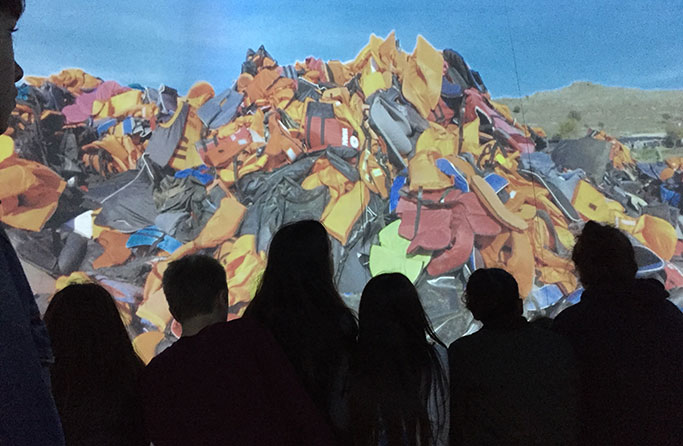8th grade students and students from Ms. Brown’s and Ms. González’s 10th grade classes visited the Forced From Home – Doctors Without Borders Exhibit on the Long Wharf in downtown Boston. The exhibit was an outdoor, interactive public display put together by aid workers who led students on a guided tour of the current global refugee crisis and the experiences they have at the refugee camps when providing medical care to hundreds of men, women, and children forced from their homes.
The field trip provided students an opportunity to examine the current global refugee crisis and challenge stereotypical ideas of the world and issues of social justice. During their trip, students were guided through various stations which were set-up to simulate the experiences people face when they have to flee their homes and the process they encounter as they try to find a camp in which to resettle. At the first station, the interior of a home, the aid worker/ tour guide talked with students about the push factors (civil strife, famine, natural disaster) which cause people to leave their homes. To provide them with an example, the guide had them imagine their village was under attack and then gave them 30 seconds to pack 5 items which we thought were most important.
As I watched students scramble to select their possessions, I overheard “Everything is important, how can I select just 5 things, I need them all.” Some of the items students selected were cell phones, water, passports, motorbikes, and food. As we went through each station in the exhibit, students had to give up one of their items to pay for passage out of the area that pushed them from home. The simulation provided us with a view into the journey refugees go through before they actually reach a refugee or internally displaced persons camp. -Ms. González
This field based experience provided Beaver students with the opportunity to examine the meaning of global citizenship and the responsibilities of the international community in addressing this humanitarian crisis. As they examine the growth and role of the United States in their history classes, students are reminded that many of our current global issues connect to events they study from the past.
See more photos on our Facebook page.

